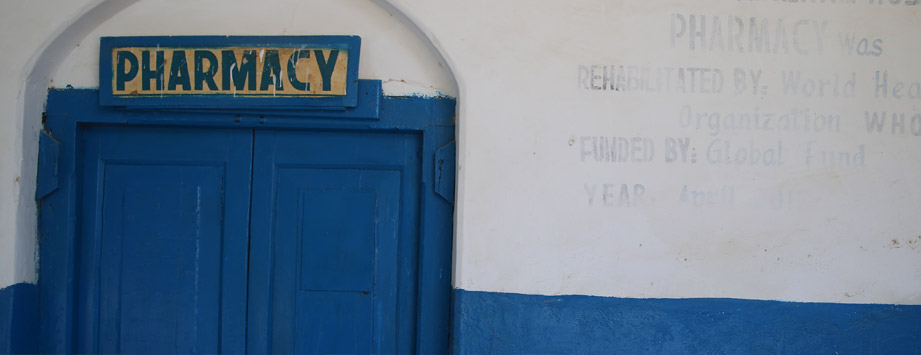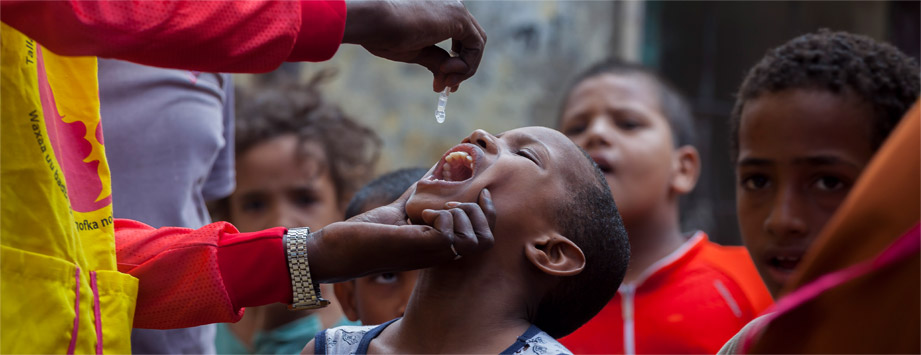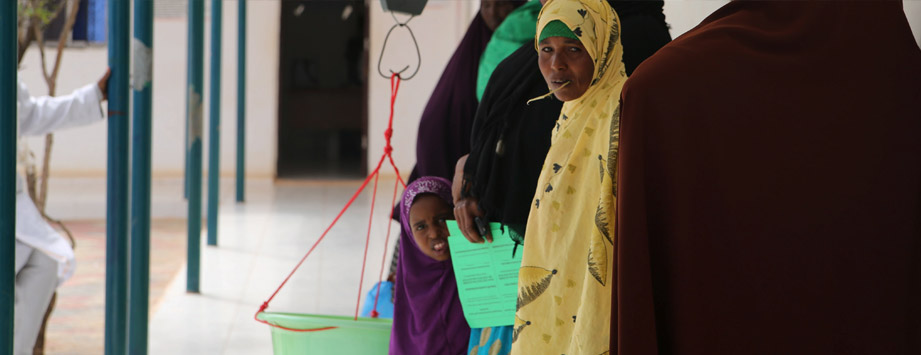Essential medicines and pharmaceutical policies
Who we are
What we do
In collaboration with health authorities, we work to promote equitable access to safe, effective and high-quality essential medicines, vaccines and other health products primarily through the following actions:
Establish national supply chain management
We help establish and maintain a safe supply chain of essential medicines in the country.
Support the management of essential medicines
We support the management and safe storage of essential medicines and other pharmaceutical products.
Assess quality problems of medicines
We assess problems related to the quality of medicines and tackle problems related to the availability and accessibility of good-quality medicines for delivery of safe health care.
Our impact
What we have achieved
What is next
Polio eradication
Who we are
What we do
Conduct vaccination
In collaboration with health authorities and partners, we work to eradicate polio, primarily through the following actions: Respond to Polio Outbreaks by conducting vaccination campaigns. The last outbreak of wild poliovirus in Somalia was in 2014. However, since December 2017, two concurrent outbreaks of circulating vaccine-derived polio virus (cVDPV) have occurred, resulting in the detection of 19 children with paralysis. In order to interrupt the spread of polio virus and avoid additional infections and disabilities in vulnerable Somali children, we conduct nationwide and smaller, case- response immunization campaigns that aim to reach every child to boost their immunity. Maintaining a high level of immunity in the entire population, including mobile populations and across borders, is essential to prevent future outbreaks.
Detect acute flaccid paralysis
We search for acute flaccid paralysis in children under 15 years to ensure that, if found, no cases of poliovirus spread any further. Polio teams visit health facilities included in the active surveillance network (793 of 1267 health facilities). As part of passive surveillance, polio teams also liaise with focal persons in 413 other health facilities to report (zero reporting) on any suspected cases. Village polio volunteers support house-to-house surveillance in hard-to-reach and insecure areas.
Detect polioviruses in the environment
We complement surveillance of acute flaccid paralysis by searching for polioviruses in the environment. Samples are collected from sewer systems at four sites in Banadir region, and analysed at the Kenya Medical Research Institute in Nairobi. This surveillance helps signal whether people are infected and are shedding virus in their stool.
Build capacity
We develop the capacity of field staff (including WHO, UNICEF and health ministry staff) in the areas of surveillance and outbreak response.
Support routine childhood immunization
We support routine immunization of children by sharing resources, such as staff, systems and infrastructure with country's EPI. We integrate activities during vaccination campaigns and help strengthen the capacity of the Somali EPI.
Raise awareness of immunization
We work with authorities, UNICEF and local media outlets to raise awareness of the benefits of vaccines and vaccination, the campaigns that are being conducted and vaccination schedules, and to encourage caregivers to vaccinate children. Health workers use Somali information, education and communication materials to raise awareness among caregivers. Manage information. We collect data from acute flaccid paralysis and disease surveillance, EPI and vaccination activities, and other work streams, including from partner agencies (such as mapping of internally displaced people from the International Organization for Migration). This information guides decision-making and allows us to assess the quality of work done across the country. We post the information collected and the high-quality maps produced on the website www.somaliapolio.org. Polio teams are progressively using real-time, electronic means of reporting for data management (Open Data Kit software).
Support other health interventions
We provide support to other health interventions by sharing resources and systems established by the polio eradication programme in the past 22 years. For example, our systems are used to improve surveillance for diseases (including measles) and outbreak control (such as cholera).
Our impact
What we have achieved
What is next
EWARN
Early Warning and Response Network (EWARN) is a network of health facilities and public health professionals that support the early detection and timely response to epidemic-prone diseases through collection, reporting, investigation, analysis and dissemination of epidemic-related data.
EWARN was first implemented in Somalia in 2012: following its collapse during the ongoing conflict, it was relaunched in 2017. Information is now collected on mobile devices (tablets) which are preloaded with EWARN software containing the necessary forms and reports for information sharing. The software is designed to auto-generate analytical and epidemiological reports to aid decision-making.
Somalia has 450 designated EWARN sites across the country. The coverage is sufficient to ensure timely alerts to prevent and respond to disease outbreaks.
Communicable diseases
Who we are
The HIV programme of the WHO country office supports activities to reduce HIV infection and AIDS, and coinfection of HIV and tuberculosis (TB) in the country. Services are delivered through 16 health facilities that provide antiretroviral therapy and 93 TB treatment facilities.
The malaria and vector control team supports actions to reduce malaria and improve vector control across the country. Our activities span all levels of the health systems. The whole population of Somalia is considered at risk of malaria. However, in 2019, 51% of the country’s population was living in a high-risk transmission zone for malaria (> 1 case per 1000 population).
The TB programme implements the national TB programme jointly with national TB programme managers and other partners implementing TB control activities.
What we do
In collaboration with health authorities and partners, we work to tackle HIV/AIDS, malaria and TB in Somalia, primarily through the following activities:
» HIV/AIDS
Developing capacity of health workers
We provide formal and on-the-job training on HIV/AIDS testing and counselling, which is the gateway to HIV/AIDS treatment, as well as training on anti-retroviral therapy.
Enhancing laboratory services
We conduct external quality assurance of HIV testing to validate the accuracy of HIV testing.
Supporting people living with HIV/AIDS
We train staff at HIV treatment facilities on monitoring the health of HIV/AIDS patients, offering supportive counselling and following up on adherence to instructions on taking the medication.
Collecting and analysing data on HIV
We conduct HIV sentinel surveys every 2–3 years to measure the prevalence of HIV and generate national estimates for various population groups. We collect data from 20 antenatal clinics and five clinics for patients with sexually transmitted infections.
Advocating to guide appropriate responses
We use the data collected on the HIV/AIDS situation in the country to advocate for policy responses and decisions.
» Malaria and vector control
Enhancing diagnosis and treatment
We distribute rapid diagnostic tests for prompt diagnosis of malaria and provide medicines to improve access to malaria treatment anywhere at any time.
Supporting vector control
We distribute insecticide-treated nets and carry out indoor residual spraying in high-risk areas, supplemented by management of larval sources.
Monitoring
We monitor malaria drug efficacy and resistance to inform treatment policies and to ensure early detection of, and response to, drug resistance.
Collecting and analysing data on malaria
We collect surveillance data on malaria in a standardized way to estimate the malaria burden and map risk to guide control interventions.
Developing capacity of health workers
We train health workers on laboratory diagnosis, case management, vector control and malaria surveillance.
What we have achieved
» HIV/AIDS
- Established 16 treatment centres for antiretroviral therapy: at the end of 2019, 3472 patients (32.5% of all people estimated to be living with HIV/ AIDS) were alive and on treatment.
- Supported 79.8% of patients with TB coinfected with HIV to begin antiretroviral therapy, thus very nearly attaining the target of 80%.
- Screened 75% of people living with HIV to check for TB during clinic visits, more than the target of 72%.
- Supported 89 of 93 (96%) TB centres in providing HIV testing and counselling; as a result, 91.2% of TB patients learnt of their HIV status in 2019.
- Provided technical assistance for transition planning to the new dolutegravir-based regimens for antiretroviral therapy.
- Completed analysis of data for the 2018 round of HIV sentinel surveillance. We also provided support to the country to update the national estimate of HIV prevalence, beyond pregnant women and people with symptoms of sexually transmitted infections.
» Malaria and vector control
- Malaria case finding substantially increased from 2014 to 2019, a 188% increase.
- Use of rapid diagnostic tests for case detection substantially increased from 2014 to 2019, a 322% increase.
- Use of long-lasting insecticidal net substantially increased from 2014 to 2019: 1.36 million people protected (18% of people living in high malaria transmission zone) in 2019 compared with 697 089 in 2014, an overall increase in coverage of 95%.
- Indoor residual spray to prevent malaria outbreaks after flooding in several parts in the country in 2019 protected 183 629 people.
- Detected Anopleles stephensi, which was suspected of being responsible for recurrent and prolonged malaria transmission in several regions, such as Bossaso, Bari and Berbera.
- Conducted two therapeutic efficacy studies in 2019, in line with plans to conduct at least two studies on an annual basis.
- Systematically monitored the efficacy of insecticides used for vector control and developed national guidelines for insecticide use.
- Introduced new vector control management, such management of larval sources through distribution of larvivorous fish and rehabilitation of berkit (reservoirs).
- Conducted capacity-building for health workers at selected health facilities supported by the private sector.
- Conducted a programme review for the malaria programme towards the development of the National Strategic Plan (2021–2025) for Malaria Control and Elimination.
What is next
In collaboration with health authorities and partners, we work to tackle HIV/AIDS, malaria and TB in Somalia, primarily through the following activities:
» HIV/AIDS programme
From 2021 to 2023, the HIV/AIDS programme aims to undertake the following actions:
- Provide technical support to the programme with the aim of: having 5026 people living with HIV/AIDS on antiretroviral therapy by 2023; and decreasing the proportion of patients dying and being lost to follow-up in the first 12 months of receiving treatment from 24.5% in 2019 to 15.0% by 2023. In addition, the programme aims to increase the proportion of people starting treatment following diagnosis to 93% by 2023.
- Update the operations and training manual for Integrated Management of Adolescent and Adult Illness in light of the transition to dolutegravir-based regimens.
- Increase testing among key vulnerable populations through a mix of testing approaches (e.g. facility-based outreach testing and self-testing) and integrate testing and counselling within existing targeted service settings.
- Work to increase the coverage of testing for viral load, which indicates amount of HIV in a person’s blood, and testing for CD4 (a type of white blood cell), which indicates immune function in patients living with HIV.
- Scale up further HIV diagnostics and treatment for TB patients.
- Design integrated social and behaviour change communications for key vulnerable populations.
- Contribute to health systems strengthening through integrating services into the Essential Package of Health Services.
» Malaria and vector control programme
Enhancing diagnosis and treatment
As part of the national strategic plan for 2021– 2025, the programme aims to implement the following activities between 2021 and 2023:
Case management
- Test at least 278 654 of an estimated 292 334 suspected malaria cases (95%) for parasitological confirmation.
- Provide at least 17 888 of an estimated 18 252 confirmed malaria cases (98%) with first-line treatment.
- Test at least 383 835 of an estimated 417 406 suspected malaria cases (92%) for parasitological confirmation, which confirms malaria and guides treatment.
- Vector control: through mass campaigns, distribute at least 2 399 488 long-lasting insecticidal nets, covering an at-risk population of 4.319 million.
- Carry out indoor residual spraying to respond to any early signs of a malaria outbreak.
- Prioritize six districts for malaria elimination.
- Specific prevention interventions: provide intermittent preventive treatment in pregnancy in 13 districts where malaria endemicity is more than 10%.
- Contribute to health systems strengthening through integrating services into the Essential Package of Health Services.






